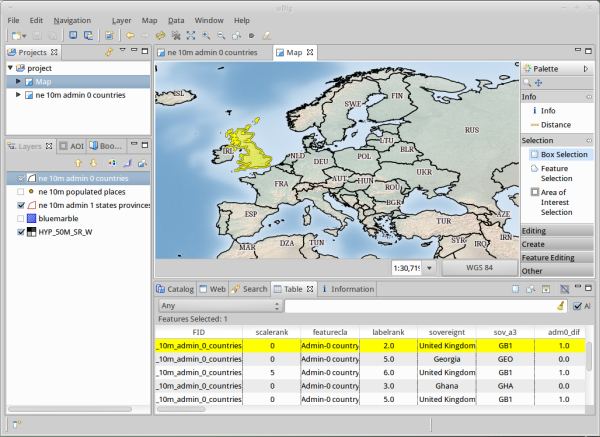User-Friendly Desktop Internet GIS (uDig) is an open source spatial data viewer/editor, with special emphasis on the OpenGIS standards for internet GIS, the Web Map Server and Web Feature Server standards.
uDig aims to be:
- User friendly – providing a familiar graphical environment for GIS users.
- Desktop located – thick client.
- Internet oriented – WMS, WFS, WCS, GeoRSS, KML, tiles geospatial web services.
- GIS ready – providing the framework on which complex analytical capabilities can be built, and gradually subsuming those capabilities into the main application.
It is a Java based open source desktop application framework, built with Eclipse Rich Client (RCP) technology.
Features include:
- An out-of-the-box application, with the ability to view, edit and print files, database (Oracle, SDE, PostGIS) and Web Feature Servers (WFS).
- An industry-standard extension framework (RCP) for adding new functionality to the application.
- A rich toolkit of Java functionality, ready for developers to build on.
- Uses GRASS for complex vector operations.
- PostGIS.
- WMS.
- Desktop Client with Drag and Drop integration for File explorer and Web Browser.
- Integrate with your existing infrastructure: ArcSDE, Oracle, DB2 and more.
- Work with local files: Shapefile, jpeg, png, tiff and more.
- Work with advanced spatial raster formats: ECW, MrSID, JPEG 2000.
- Support for compliant Web Map Servers (GeoServer, MapServer tested).
- Integrated Web experience with an embedded browser that recognises OGC web services and smoothly adds links to the onscreen map.
- Style Layer Descriptor control of rendering allowing you to publish your Map using the same settings in uDig as with popular Web Map Servers.
- Deep integration of standards allowing the application to swap between the appropriate service as required for display, interaction and editing.
- Printing and PDF Generation.
- Native support for many other data sources.
- Cross-platform support – runs on Linux, Mac OS X, and Windows.
Website: udig.refractions.net
Support: Documentation
Developer: Refractions Research
License: Dual BSD / EPL (Eclipse Foundation)

uDig is written in Java. Learn Java with our recommended free books and free tutorials.
Return to Scientific | Return to Earth Science
| Popular series | |
|---|---|
| The largest compilation of the best free and open source software in the universe. Each article is supplied with a legendary ratings chart helping you to make informed decisions. | |
| Hundreds of in-depth reviews offering our unbiased and expert opinion on software. We offer helpful and impartial information. | |
| The Big List of Active Linux Distros is a large compilation of actively developed Linux distributions. | |
| Replace proprietary software with open source alternatives: Google, Microsoft, Apple, Adobe, IBM, Autodesk, Oracle, Atlassian, Corel, Cisco, Intuit, and SAS. | |
| Awesome Free Linux Games Tools showcases a series of tools that making gaming on Linux a more pleasurable experience. This is a new series. | |
| Machine Learning explores practical applications of machine learning and deep learning from a Linux perspective. We've written reviews of more than 40 self-hosted apps. All are free and open source. | |
| New to Linux? Read our Linux for Starters series. We start right at the basics and teach you everything you need to know to get started with Linux. | |
| Alternatives to popular CLI tools showcases essential tools that are modern replacements for core Linux utilities. | |
| Essential Linux system tools focuses on small, indispensable utilities, useful for system administrators as well as regular users. | |
| Linux utilities to maximise your productivity. Small, indispensable tools, useful for anyone running a Linux machine. | |
| Surveys popular streaming services from a Linux perspective: Amazon Music Unlimited, Myuzi, Spotify, Deezer, Tidal. | |
| Saving Money with Linux looks at how you can reduce your energy bills running Linux. | |
| Home computers became commonplace in the 1980s. Emulate home computers including the Commodore 64, Amiga, Atari ST, ZX81, Amstrad CPC, and ZX Spectrum. | |
| Now and Then examines how promising open source software fared over the years. It can be a bumpy ride. | |
| Linux at Home looks at a range of home activities where Linux can play its part, making the most of our time at home, keeping active and engaged. | |
| Linux Candy reveals the lighter side of Linux. Have some fun and escape from the daily drudgery. | |
| Getting Started with Docker helps you master Docker, a set of platform as a service products that delivers software in packages called containers. | |
| Best Free Android Apps. We showcase free Android apps that are definitely worth downloading. There's a strict eligibility criteria for inclusion in this series. | |
| These best free books accelerate your learning of every programming language. Learn a new language today! | |
| These free tutorials offer the perfect tonic to our free programming books series. | |
| Linux Around The World showcases usergroups that are relevant to Linux enthusiasts. Great ways to meet up with fellow enthusiasts. | |
| Stars and Stripes is an occasional series looking at the impact of Linux in the USA. | |
